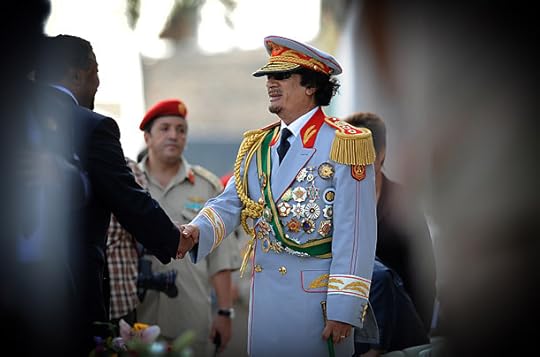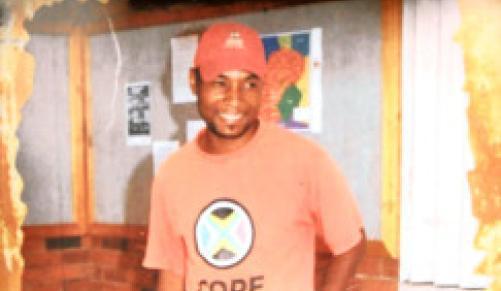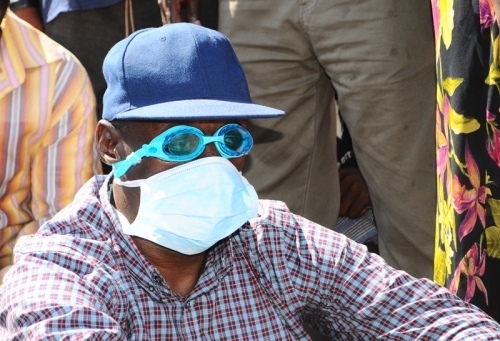Sean Jacobs's Blog, page 654
April 26, 2011
Queer Families
Sometimes AIAC collaborator Nerina Penzhorn's documentary, "Waited For," about interracial adoptions in South Africa of mostly black children by a group of mainly white lesbian women, has been accepted to Frameline, considered the largest LGBT film festival in the country. According to Nerina, the film "… explores the ways in which these queer families challenge and are challenged by the traditional hierarchies of race and heterosexism that are still deeply entrenched in the South African psyche."








Soul Food
The trailer for director Byron Hurt's new film "Soul Food Junkies." The film, "… explores the history and social significance of soul food to black cultural identity and its affect on African-American health, good and bad. Soul food will also be used as the lens to investigate the dark side of the food industry and the growing food justice movement that has been born in its wake." You can watch a 12-minute web trailer here. Hurt, for those who forgot, also directed the highly acclaimed Hip-Hop: Beyond Beats and Rhymes that came out in 2006 and the short, Barack and Curtis.








April 25, 2011
Music Break
The video "Niemand" [No One] by German singer, Joy Denalane (featuring her husband Max Herre) off her new album "Maureen," which is set for release next month.
Via Afro-Europe








Fool's Gold
Fool's Gold's "Surprise Hotel."
The group started as a side project of two young LA musicians, vocalist/bassist Luke Top and lead guitarist Lewis Pesacov, who set out to explore their shared love of various forms of African music (specifically Congolese, Ethiopean, Eritrean and Malian), Krautrock, and 80s dance influenced pop music.
Via Charles Leonard: "These guys have a healthy obsession with African music."








The Bang Bang Club
Not a ringing endorsement from film critic Jeanette Catsoulis in The New York Times for "The Bang Bang Club," the new feature film based on the real-life adventures of four white South African photographers making their reputations recording the political violence of the early 1990s around Johannesburg:
Why … do we care not one bit when Pulitzers are won [by some of the protagonists] and bullets unsuccessfully dodged? The answer lies partly in [the director's] refusal to elucidate the racial politics [of South Africa] or engage with the world outside the film's incoherently chaotic bubble. Elbowing into war zones his heroes snap harrowing photographs whose effect, if any, on the international conversation is never mentioned. Ethical conundrums are dangled without being addressed as we linger on the men's emotional pain, assuaged by soft-focus swimming, drinking and making out. In this way a particularly ugly conflict is reduced to not much more than a stream of pretty pictures.
Damn.








April 24, 2011
Music Break

Oakland The Hieroglyphics and Goapele singing about some kind of Soweto circa 2002.
You can go to the jungle/Go to the city/Visit Soweto/Live in the Bay or/Somewhere in between/But you'll never be unseen … Maybe I'll go to Angola or the Gold Coast/And blow smoke with the old folks cause they know most"
H/T Charles Leonard.








Gaddafi at the Met
Colonel Gaddafi's aide wants to engineer a retrospective of "four decades of superior dress sense" at the Costume Institute's annual gala at the Metropolitan Museum of Art in N.Y.C. He's trying for 2013. Talib, an aide to Mr. Moussa Khalid Wahabb, the new Minister for Cultural Affairs in Libya, contacted "New York Times" Fashion Editor Horacio Silva to score the deal, one only imaginable to fashion royalty.
In the email sent to Silva:
…the compound next to the presidential palace was badly damaged in a bombing raid and we are very concerned should the same happen to the palace the result might be the destruction of over 3400 items of breathtaking sartorial magnificence: Decades of Military uniforms and leisure wear mostly hand made from the finest fabrics on earth that show not only President Col. Gaddafi's strong commitment to leadership qualities but his relaxed and informal side as a devoted family man who loves to entertain.
Furthermore, many, including Michael Jackson, were not only fans, but shameless copiers of the unmistakable sartorial prowess of the G-man:
[H]style and substance but many western rock stars and celebrities have also been won over by the Gaddafi look: most notably Michael Jackson in the 1980′s copied the signature motif military style of our leader to great chart success on his own terms.
If Alexander McQueen can get a post-mortem party this year ("Savage Beauty"), why can't the man whose costumery and demeanour led to his latest title, "Depressed Nigerian grandmother," have a go?








It's Time To Be Offended
If the murder of Andries Tatane is a watershed moment in public perceptions of state violence after Apartheid, it is also teaching us a thing or two about South Africa's media.
Had this police murder happened in Tunisia, Egypt or Libya, we would probably all be glued to our TV screens, praising the BBC or Al-Jazeera for their coverage in bringing images that brought home the extent of the oppression in those countries and the bravery of protesters.
What do we do in South Africa?
Mostly elites complain about the SABC showing violence on television, insert "allegedly" before "killed" in news reports, denounce the protesters as "mobs" (as the Sowetan did) and run nonsense polls on newspaper websites to find out if the police brutality really was brutality. Timeslive (that's the website of The Times and Sunday Times) ran an online poll on its site: "Were the police justified in killing the Ficksburg protester?" This was one of the lowest points in the reporting of Tatane's death over the last few days. Who thought this was a good idea to publish a poll asking whether the police was "justified in killing Tatane"? Was there no editor on duty that could point out that there could be no possible situation in which the beating and shooting of an unarmed citizen by his own police force could be seen as "justified"?
Its's noteworthy that Tatane's killing was brought to us by traditional media – the much-criticised and chaotic SABC at that. Just as Al Jazeera proved one of the most insightful platforms for reporting on the pro-democracy protests in the Middle East and North Africa.
That Tatane's death did make the reactions it did – unlike other injuries and deaths sustained in the almost eight thousand protests over the last six years– was probably partly because the SABC was bold enough to broadcast the shocking video of Tatane's murder.
It would be interesting to research the extent to which the protests themselves were organised via new media technologies. Twitter and Facebook were unlikely to play a big role and access to smartphones, while growing, is not yet widespread among the majority of South Africans. However, chances are mobile phones were probably instrumental in organising the protesters (The Sunday Times on 17 March published Tatane's last SMS to his wife, asking her if she would join the protest). Twitter and Facebook did however play a role in amplifying the news of Tatane's killing to the middle classes, who now no longer can claim that they didn't know of the war being waged against the poor in post-apartheid South Africa. Those of us who don't watch SABC, heard of the footage via Facebook and Twitter and watched it on Youtube.
But what Tatane's death also brought to light, was how the mainstream media's narrow understanding of journalistic conventions such as'objectivity' and of social responsibility as not giving offense can hamper its ability to portray the realities of this country in the stark colours needed in order to bring about social change.
Media Monitoring Africa criticized the media for violating Tatane's privacy and dignity by publishing an image of him "as he lay in the arms of a man, who was clearly stricken with grief." The MMA's ongoing concern for the dignity of news subjects is legitimate, but their application of standards of privacy in this case is questionable in the light of the importance of the image in terms of reframing dominant narratives of protest in the mainstream commercial news media. Where their criticism is especially misguided is what they seem to regard as an unnecessarily graphic portrayal of violence which might shock and traumatise viewers. MMA criticizes Business Day, Daily Sun and Sowetan for making "no effort to protect the public, including children and sensitive readers, from exposure to violent and traumatic imagery". Here the MMA displays a narrow understanding of ethics as being primarily about not giving offense, instead of upholding a larger value system with regards to the media's role in a democratic, transitional society. The argument in favour of publishing a shocking image such as this one is not merely a consequentialist one (to argue that the pain caused to individuals may be justified in terms of the good consequences it might hold for the majority of the public), but can be seen in terms of meaning-making. The shocking image might be crucial in bringing the media-consuming public to a deeper understanding of the nature of our democracy, the right to freedom of expression and how power operates in post-apartheid South Africa.
An acquiantance, a close observer of South African politics, has suggested that this is one of those times when the pictures and video footage of Tatane's violent death could galvanize reform or dissatisfaction with the direction of the ANC. Tatane's death may become and iconic image like those of a Saigon police chief, who collaborated with American occupiers, shot a Vietnamese nationalist during the Tet offensive, a desperate Tunisian fruit seller setting himself on fire, a necklaced Askari, or the Mozambiquan immigrant Ernesto Alfabeto Nhamuave who was set alight during the xenophobic violence in South Africa in 2008. "All these images got to the core of stories that are tough to explain in 500 words," he said in an email. "I would think that someone in Waterkloof Ridge eating their Weetbix and reading a Pretoria News story about bad local councillors in Ficksburg won't bat an eyelid, but an image of Tatane's death may convey the sort of anger brewing across the country."
It appears Tatane had done media studies classes at the University of Cape Town and Wits, but never graduated. Such was his faith in the media that he reportedly started his own newspaper, "The Voice." The biggest dignity that the media could afford Tatane after his death is to let this voice be heard. It is time for the people of South Africa to be offended.
–Herman Wasserman, Sean Jacobs








April 23, 2011
Forcing Museveni from Power
Journalist Pascal Zachary–on his blog Africa Works–argues that the protests in Uganda that started April 4, are strategically "ill-timed" and that opposition leader Kizza Besigye (shot in the hand, and in jail at present), while brave, can only take the movement against Life President Yoweri Museveni so far:
The [current] protests seem ill-timed. They should have come before the national election, not afterwards. Besigye is brave and consistent in his criticisms of Museveni's cronyism, and excessive spending on military equipment. Yet he lacks strong tactical instincts and his failure to galvanize the diverse opponents of Museveni into a overwhelming political movement indicates that perhaps the time has come for his to step aside and allow a younger, more creative opposition leader to tackle the enormous task of forcing Museveni from power.
Read the rest here.








'Suffer'
Sean Jacobs's Blog
- Sean Jacobs's profile
- 4 followers















